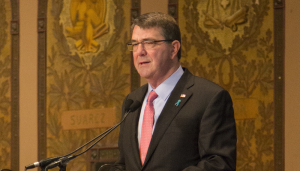
Secretary of Defense Ashton Carter spoke to Reserve Officers’ Training Corps cadets about the issue of sexual assault in the military in Gaston Hall on Wednesday.
Secretary of Defense Ashton Carter discussed the importance of eliminating sexual assault in the military in Gaston Hall on Wednesday.
The audience was filled with over 250 Reserve Officers’ Training Corps cadets from several universities in the Washington area.
The event, which was held in honor of Sexual Assault Awareness and Prevention Month, was attended by ROTC cadets from Georgetown University, the University of Maryland, Howard University, George Mason University and George Washington University.
Although the Department of Defense estimates that the number of sexual assaults within the military has decreased over the past fiscal year, at least 18,900 service members were estimated to have experienced unwanted sexual contact in the past year.
According to Carter, the high number of sexual assault cases in the military fractures the ethos of the armed forces, as it undermines the military’s ability to perform by violating principles of trust.
“We’re based on trust. We have to trust,” Carter said. “You have to trust in the soldier in the foxhole next to you. You have to trust in the sailor you’re underway with. You have to trust in the airmen on your wing. And you have to trust in the marine on your flank. And these violations and these assaults are not just violations of the law, they are violations of that trust, which is essential to our mission.”
To remain a strong military presence in an increasingly combative world, Carter stressed the importance of eliminating sexual assault. According to Carter, servicemen and women are often put in dangerous environments, which can present opportunities for sexual assault.
Carter also said that the successful future of military recruiting depends upon the method by which the military deals with the issue of sexual assault. As such, Carter said that the military should view the Department of Defense’s strategy in dealing with sexual assault as a benchmark.
“Now, our nation is looking to the Defense Department to lead boldly on sexual assault because they admire our institution and its values and its culture of learning,” Carter said.
Carter noted several major lessons that the military has learned in combatting sexual assault.
For instance, Carter suggested prevention as the most important way to eradicate sexual assault, and warned that inappropriate behavior and degrading language often lead to sexual assaults.
Additionally, Carter stressed that further military resources and time will be used to understand how to deal with sexual assault.
“Stopping sexual assault will be a focus of my time as secretary of defense. But as leaders of the future force, I ask that you too make eradicating these crimes on of your personal missions.”
Carter’s speech was followed by a question-and-answer period in which most of the questions concerned foreign intervention.
Howard University freshman cadet Michael Thompson said he appreciated the opportunity to interact with Carter, as it allowed him to learn about a topic vital to the future of the military.
“I thought it was really insightful,” Thompson said. “It was nice to hear from the secretary of defense and get some sort of interaction with him, especially on such a relevant topic for the military today.”




















